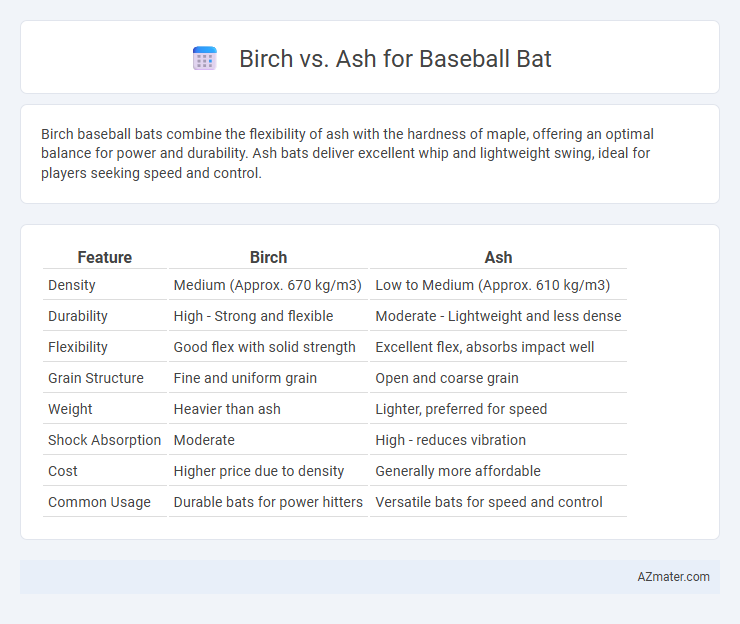Birch baseball bats combine the flexibility of ash with the hardness of maple, offering an optimal balance for power and durability. Ash bats deliver excellent whip and lightweight swing, ideal for players seeking speed and control.
Table of Comparison
| Feature | Birch | Ash |
|---|---|---|
| Density | Medium (Approx. 670 kg/m3) | Low to Medium (Approx. 610 kg/m3) |
| Durability | High - Strong and flexible | Moderate - Lightweight and less dense |
| Flexibility | Good flex with solid strength | Excellent flex, absorbs impact well |
| Grain Structure | Fine and uniform grain | Open and coarse grain |
| Weight | Heavier than ash | Lighter, preferred for speed |
| Shock Absorption | Moderate | High - reduces vibration |
| Cost | Higher price due to density | Generally more affordable |
| Common Usage | Durable bats for power hitters | Versatile bats for speed and control |
Introduction to Birch and Ash Baseball Bats
Birch baseball bats combine the lightweight feel of ash with the hardness of maple, providing a balanced performance that appeals to players seeking both flexibility and durability. Ash bats are characterized by their strong grain structure, which offers excellent whip and a larger sweet spot, ideal for players who prioritize speed and control. Both woods offer unique benefits, with birch providing a slightly stiffer swing and improved longevity, while ash delivers a classic, forgiving hitting experience favored by many professional hitters.
Physical Properties of Birch vs Ash
Birch baseball bats combine the hardness of maple with the flexibility of ash, offering superior shock absorption and a balanced swing weight compared to ash. Ash bats are lighter and more flexible due to their open grain, which provides excellent whip but less durability and resistance to dents. The denser grain structure of birch enhances its strength and impact resistance, making it a preferred choice for players seeking a durable yet responsive bat.
Performance Differences: Birch vs Ash
Birch baseball bats offer a unique combination of stiffness and flexibility, providing greater pop and a larger sweet spot compared to ash bats. Ash bats are known for their lightweight and excellent shock absorption, making them ideal for players prioritizing control and comfort. Performance differences highlight birch's superior durability and power potential, whereas ash excels in handling and feel during the swing.
Durability and Lifespan Comparison
Birch baseball bats offer a unique blend of hardness and flexibility, providing excellent durability by resisting dents and cracks better than ash. Ash bats are lightweight with a larger sweet spot but tend to splinter or crack more quickly under intense use. Overall, birch bats generally have a longer lifespan due to their superior resistance to damage and consistent performance over time.
Flexibility and Hardness: Impact on Play
Birch baseball bats combine the hardness of maple with the flexibility of ash, offering a balanced blend that enhances both pop and durability during play. Ash bats provide superior flexibility due to their grain structure, resulting in a larger sweet spot and better shock absorption but generally less hardness and power on contact. The choice between birch and ash impacts gameplay by influencing bat speed, feel, and ball exit velocity, with birch favoring power hitters and ash catering to players seeking a lighter, more flexible bat.
Weight and Balance Considerations
Birch baseball bats provide a balanced combination of lightweight design and solid durability, making them ideal for players seeking enhanced swing speed without sacrificing power. Ash bats tend to be slightly heavier with a more flexible grain structure, offering better vibration absorption but potentially less balanced swing control. Weight and balance in birch bats generally allow for quicker reaction times, while ash bats favor a more traditional feel with increased swing weight.
Popularity Among Professional Players
Birch and ash are both popular materials for baseball bats, with professional players favoring each for specific performance traits; ash offers a lightweight feel and excellent flex, contributing to its long-standing use in MLB. Birch bats combine the durability of maple with the flexibility of ash, leading to increased usage among pros seeking a balance of power and control. Statistics from MLB show a rising trend in birch bat usage, reflecting its growing popularity among professional hitters.
Price and Availability of Birch and Ash Bats
Birch baseball bats generally offer a mid-range price point, making them more affordable than some premium ash models while still providing excellent durability and performance. Ash bats tend to be more widely available due to their long-standing popularity and extensive market presence, often found at most sporting goods retailers both in-store and online. Birch bats are gaining traction but may have limited availability in smaller markets, potentially requiring online orders or specialty stores for purchase.
Pros and Cons of Birch Baseball Bats
Birch baseball bats offer a unique combination of flexibility and hardness, providing players with a balanced feel that enhances both power and control. Their durability outperforms ash in terms of resistance to cracking, while still delivering a lighter weight compared to maple, making them ideal for players seeking quick swings. However, birch bats can be slightly more expensive and may require a break-in period before reaching optimal performance.
Pros and Cons of Ash Baseball Bats
Ash baseball bats offer lightweight durability and excellent flex, enhancing swing speed and power for players seeking quick, responsive hits. However, ash bats tend to splinter on impact over time, reducing their lifespan compared to alternatives like birch, which combines flexibility with greater hardness. The porous grain structure of ash allows for better vibration absorption, yet its softer composition may lead to quicker wear under heavy use.

Infographic: Birch vs Ash for Baseball Bat
 azmater.com
azmater.com